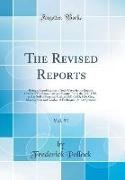Read more
Excerpt from The Revised Reports, Vol. 91: Being a Republication of Such Cases in the English Courts of Common Law and Equity, From the Year 1785, as Are Still of Practical Utility; 1851-1853; 1 De Gex, Macnaghten and Gordon; 8 Exchequer; 21 Law Journal
The Revised Reports have now come within the period of reformed procedure which covered nearly twenty-five years before the Judicature Acts reduced pleading to its lowest terms. Both the Common Law Procedure Acts and the corresponding legislation and orders for Chancery practice, which so far as we remember never had any current short name, did excellent service in their time, and did not pass away without regrets. In the common law Courts there was a generation of great judges it is enough to name, for the three Courts at Westminster, Blackburn, Willes, and Bramwell, whom in the progress of these reports we shall meet with on the bench before long. The work done in the Court of Chancery was good and sound, if less brilliant; among other things, the foundations of modern company law were being laid. The latter part, at all events, of this period is within the memory of members of the profession who are still active. Thus the law we are now dealing with may be called modern in a pretty strict sense; and we have new thought it right to account for every case in the authorized reports, that the learned reader may see at once what we have not thought to call for reproduction in full, and, so far as practicable in a short compass, the reasons for our decision. We felt a little reluctance in keeping only the head-note of Salmons v. Miller, p. 759, where it was decided that in the parliamentary oath of allegiance, as it then stood, the words upon the true faith of a Christian were material, and a Jew could not effectually take the oath omitting these words. The case is a curious piece of.
About the Publisher
Forgotten Books publishes hundreds of thousands of rare and classic books. Find more at www.forgottenbooks.com
This book is a reproduction of an important historical work. Forgotten Books uses state-of-the-art technology to digitally reconstruct the work, preserving the original format whilst repairing imperfections present in the aged copy. In rare cases, an imperfection in the original, such as a blemish or missing page, may be replicated in our edition. We do, however, repair the vast majority of imperfections successfully; any imperfections that remain are intentionally left to preserve the state of such historical works.

